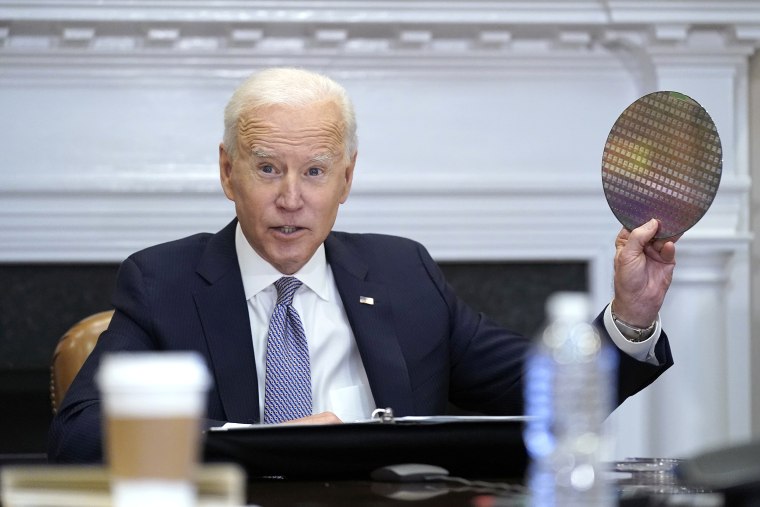After two weeks away from Capitol Hill, members of the House and Senate are returning to work and hearing directly from President Joe Biden -- whose infrastructure push is intensifying.
President Joe Biden is working to build bipartisan support for his sweeping $2 trillion American Jobs Plan and met Monday at the White House with a bipartisan group of lawmakers. The president wants to see Congress pass the proposal, which he is calling the "American Jobs Plan," by the end of the summer and more meetings are expected in the coming weeks.
Yesterday was emblematic of just how much time and energy Team Biden is investing in the initiative. In the morning, for example, the White House issued a fairly detailed, state-by-state report, drawn from "an array of private and public data," highlighting the many areas in which the U.S. is in desperate need of infrastructure investments.
That was soon followed by the president holding a meeting with auto-industry executives and other business leaders, making the case that his infrastructure plans include an emphasis on semiconductors and battery technology. "The plan I propose will protect our supply chain and revitalize American manufacturing," the president said.
And that was soon followed by Oval Office meetings, in which Biden pitched his plan to groups of lawmakers -- Democrats and Republicans, from both the House and the Senate -- emphasizing his willingness to compromise over legislative details.
"All kidding aside, I'm prepared to negotiate the extent of my infrastructure project as well as how we pay for it," the president said. "I am not big on window dressing, as you've observed."
All of this, of course, is the public part of the public-relations push. Behind the scenes, there's even more: White House Press Secretary Jen Psaki told reporters yesterday that Biden administration officials have also been in regular contact with lawmakers from both parties, holding "dozens, and dozens of meetings and briefings" about the American Jobs Plan.
This is what's generally known in D.C. as a "full-scale push." There's nothing passive about the degree to which the president and his team are trying to position the proposal for success. The next question is whether these efforts will succeed.
For now, the White House appears committed to trying to get Republican support for the plan -- as Biden has said many times, infrastructure has traditionally been a bipartisan issue -- which made it all the more notable when Sen. Roger Wicker (R-Miss.), one of the GOP lawmakers who met with the president yesterday, told reporters, "I view the 2017 tax bill as one of my signature achievements in my entire career. It would be an almost impossible sell for the president to come to a bipartisan agreement that included the undoing of that signature."
The "2017 tax bill," obviously, was the package of regressive Republican tax breaks that disproportionately benefited the wealthy and big corporations, and which failed spectacularly in each of its stated goals. The White House intends to scale back part of the GOP plan, raising the corporate tax rate from 21% to 28%, and using the revenue for infrastructure investments.
It's a popular idea, which would still keep the rate lower than it was before the 2017 change, and which has even drawn support from Gary Cohn -- who helped negotiate the Republican tax plan as the then-director of Donald Trump's National Economic Council.
But for Roger Wicker, it's nevertheless a deal-breaker. Asking more from big corporations would make it "almost impossible" for Republicans to support an infrastructure plan.
This matters for a couple of reasons. First, it's important to acknowledge the larger context: Republicans say they're interested in investing in infrastructure, but they won't accept increased corporate taxes. And they won't accept a gas-tax increase. And they won't accept deficit financing.
In other words, GOP lawmakers are creating legislative riddles for which there are no solutions. The apparent goal is to kill the legislation, chalking it up to a debate over financing in which they rejected every sensible solution.
And second, Republican intransigence will not go unnoticed by their Democratic counterparts. For centrists like Sen. Joe Manchin (D-W.Va.), Biden has a responsibility to engage in sincere bipartisan outreach. The president is clearly doing exactly that.
When GOP lawmakers end up balking anyway, it will be that much easier for Biden to tell Manchin and others like him, "I've tried, but Republicans won't budge. The budget reconciliation process is the only way forward."
Watch this space.
